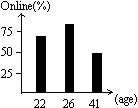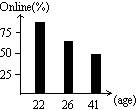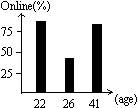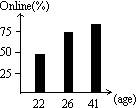
题目列表(包括答案和解析)
A typicalChinese Internet user is a young male who prefers instant messaging to e-mail, favors news, music and games sites and seldom makes online purchases(购物).According to a study, about two-thirds of survey participants use the Internet for news — often entertainment-related — or for online games.About half download music and movies.
They also tend to prefer instant messaging to e-mail, and they are depending on the Internet more frequently than before to communicate with others who have the same professions, hobbies and political interests.Online purchases still remain unpopular in China.Three-quarters of users surveyed have never bought anything over the Internet, and only 10 percent make purchases even once a month.Among those who do buy online, most pay for entertainment while others buy phone cards, or computer hardware or software.
“Many people don’t trust the quality of goods bought online,” Guo said Wednesday.“If they buy it in a store and don’t l ike it, they can easily bring it back.”
ike it, they can easily bring it back.”
The survey was done in five major cities: Beijing, Shanghai, Guangzhou, Chengdu and Changsha.Results do not necessarily project countrywide because Internet use in rural areas is lower than in cities.Guo describes the typical netizenin the five cities surveyed as young, male, richer and more highly educated.Males make up two-thirds of the Internet community, and more than  80 percent of users are under 24.Among people ages 25 to 29, 60 percent to 80 percent go online.
80 percent of users are under 24.Among people ages 25 to 29, 60 percent to 80 percent go online.
China has more than 100 million people online, second in the world to the United States.
【小题1】A typical Chinese Internet user may be the one who _________.
| A.likes to send e-mails | B.likes to buy goods online |
| C.likes to pay for entertainment | D.likes the games sites |
| A.it is more difficult for sales returns |
| B.people haven’t computers |
| C.it is not convenient to purchase on line |
| D.all goods bought online are of low quality |
 five cities?
five cities?| A.well educated | B.richer | C.female | D.young |

A typical① Chinese Internet user is a young male who prefers instant messaging to e-mail, seldom makes online purchases② and favors news, music and games sites. According to a study, about two-thirds of survey participants③ use the Internet for news — often entertainment-related — or for online games. About half download music and movies.
They also tend to prefer instant messaging to e-mail, and they are depending on the Internet more frequently than before to communicate with others who have the same professions, hobbies and political interests. Online purchases still remain unpopular in China. Three-quarters of users surveyed have never bought anything over the Internet, and only 10 percent make purchases even once a month. Among those who do buy online, most pay for entertainment while others buy phone cards, or computer hardware or software.
“Many people don’t trust the quality of goods bought online,” Guo said Wednesday. “If they buy it in a store and don’t like it, they can easily bring it back.”
The survey was done in five major cities: Beijing, Shanghai, Guangzhou, Chengdu and Changsha. Results do not necessarily project countrywide because Internet use in rural areas is lower than in cities. Guo describes the typical netizen in the five cities surveyed as young, male, richer and more highly educated. Males make up two-thirds of the Internet community, and more than 80 percent of users are under 24. Among people ages 25 to 29, 60 percent to 80 percent go online.
China has more than 100 million people online, second in the world to the United States.
1. A typical Chinese Internet user will be the one who ______.
A. likes to send e-mails B. likes to buy goods online
C. likes to pay for entertainment D. likes the games sites
2. Online purchases still remain unpopular in China mainly because ______.
A. it is more difficult for sales returns B. people haven’t computers
C. people can’t have a look at the goods D. goods bought online are of low quality
3. Which of the following words fails to describe the typical netizens in the five cities?
A. well educated B. richer C. female D. young
4. According to the text, which of the following shows the right relation between online people and their ages?
A. B.
B.
C. D.
D. 
Directions; Complete the following passage by using the words in the box.Each word can only be used once.Note that there is one word more than you need.
A.survey B.off C.better D.care E.conducted
F.differed. G.personal H.prepared I.contrast J.differences,
GAN Xiaolin, 18, only gets half a day ____ school every week since the Hubei student started senior high school.Every day, he takes core (核心的) courses from 7:10 am to 10:30 pm.
Sometimes, Gan feels extremely stressed from the heavy workload.But he hopes that his three
years of hard work toward the college entrance examination will change his life for the __.
Gan is a typical Chinese student, as shown m a recently released survey.The new survey, which was ____ by the China Youth and Children Research Center and other foreign institutions, polled(调整) about 4,000 high school and vocational school students in China, Japan, the United States and South Korea.
The five biggest frustrations listed by all the young people were: an over-busy school life, an empty___ life, dissatisfaction with their appearance, a lack of time for exercise and friends, and no spare money.
Although some of the teenage problems were y-niversai, there were big _ __ between the students when it came to the time they spent on sehoolwork.
For example, Chinese students spent the most time at school and on homework.Nearly 80 percent of them spent at least eight hours a week in school, and 56.7 percent spent two or more hours on their homework.By_, only about 25 percent of US students, 20,5 percent of Japanese students, and 15 percent of Korean students had more than two hours of homework each night.
The responses from the Chinese students also __ significantly from their peers (同龄人)
in the other three countries when asked about their life goals.
Only 16.7 percent of Chinese students said that they didn't ___ much about their future, while the figure for that category was 72.4 percent for US students, 59.1 percent for the Japanese and 58.2 percent for the South Koreans.The _ found that Chinese students were more motivated than the other students to work hard for a better life.
A typical① Chinese Internet user is a young male who prefers instant messaging to e-mail, seldom makes online purchases② and favors news, music and games sites. According to a study, about two-thirds of survey participants③ use the Internet for news — often entertainment-related — or for online games. About half download music and movies.
They also tend to prefer instant messaging to e-mail, and they are depending on the Internet more frequently than before to communicate with others who have the same professions, hobbies and political interests. Online purchases still remain unpopular in China. Three-quarters of users surveyed have never bought anything over the Internet, and only 10 percent make purchases even once a month. Among those who do buy online, most pay for entertainment while others buy phone cards, or computer hardware or software.
“Many people don’t trust the quality of goods bought online,” Guo said Wednesday. “If they buy it in a store and don’t like it, they can easily bring it back.”
The survey was done in five major cities: Beijing, Shanghai, Guangzhou, Chengdu and Changsha. Results do not necessarily project countrywide because Internet use in rural areas is lower than in cities. Guo describes the typical netizen④ in the five cities surveyed as young, male, richer and more highly educated. Males make up two-thirds of the Internet community, and more than 80 percent of users are under 24. Among people ages 25 to 29, 60 percent to 80 percent go online.
China has more than 100 million people online, second in the world to the United States.
Notes:
① typical adj. 典型的
② purchase n. / v. 购买
③ participant n. 参与者
④ netizen n. 网民
Choose the best answers according to the above:
A typical Chinese Internet user will be the one who _________.
A. likes to send e-mails B. likes to buy goods online
C. likes to pay for entertainment D. likes the games sites
Online purchases still remain unpopular in China mainly because _________.
A. it is more difficult for sales returns
B. people haven’t computers
C. people can’t have a look at the goods
D. goods bought online are of low quality
Which of the following words fails to describe the typical netizens in the five cities?
A. well educated B. richer C. female D. young
According to the text, which of the following shows the right relation between online people and their ages?
A. B.
B.
C. D.
D. 
About 12,000 years ago- long before the famous UFO crash make headlines in America—an alien spaceship crashed in China. And their descendants are still living in a faraway Chinese village today! That is the mind-bending claim made in the new book Out of Time and Place, a collection of reports from the files of Fate, a magazine edited by Terry O’Neil.
The story first came to light in 1937 when an expedition led by Chi Pu-Tei came across a group of caves deep in the Bayan-Kara-Ula Mountains. In the caves were found strange-looking skeletons with big heads and small, slender bodies—closely matching typical descriptions of space aliens. The explorers also uncovered 716 mysterious stone discs with strange hieroglyphics(象形文字) on them.
In Qinghai Province, where the mountains lie, ancient stories tell of small, skinny beings with oversize heads who came from the sky long long ago. And to this day, locals live in fear of attack from strange-looking creatures from above.
And there is more. In 1947, British scientist Karyl Robin-Evans led an expedition into the mountains and discovered a group of dwarfs(侏儒) who called themselves the Droza. “They told him that their ancestors came from a planet in the Sirius(天狼星)system and crashed in this mountain area a long time ago,” writes Hausdorf, “Many of them were killed, but survivors adapted to living on this rough planet far from home.”
For decades, Robin-Evans’ claims were dismissed as nonsense. But in 1995, the Associated Press reported that in the region a village named Huilong had been discovered—populated by 120 dwarfs ranging from 3-foot-10 to 2-foot-1tall.Hausdorf asks, “Could these people be the last living descendants of the survivors of the legendary UGO crash—the Chinese Roswell?”
1.Which of the following are the findings of Chi Pu-Tei?
a. strange-looking skeletons b. UFO crash
c. stone discs d. dwarfs
e. strange hieroglyphics f. skinny beings
|
A.a, c, d |
B.c, e, f |
C.a, c, e |
D.a, b, e |
2.Paragraph 3 and 4 mainly _____.
|
A.introduce ancient stories in Qinghai Province |
|
B.show evidence of the existence of aliens in Qinghai Province |
|
C.express fears of attack from aliens |
|
D.describe the spaceship crash in China |
3.What can be safely concluded from the passage?
|
A.This passage is a piece of science news recently issued. |
|
B.Chinese are descendants to the survivors of the alien spaceship crash |
|
C.The UFO crash in the Byan-Kara-Ula Mountains has recently been seen |
|
D.Many people are curious about aliens from outer space |
4.What is most likely to be discussed in the paragraph that follows?
|
A.Recent research about the Chinese Roswell. |
|
B.News stories about Roswell UFO Crash. |
|
C.Chi Pu-Tei’s discovery in China. |
|
D.Robin-Evans’ claims. |
湖北省互联网违法和不良信息举报平台 | 网上有害信息举报专区 | 电信诈骗举报专区 | 涉历史虚无主义有害信息举报专区 | 涉企侵权举报专区
违法和不良信息举报电话:027-86699610 举报邮箱:58377363@163.com